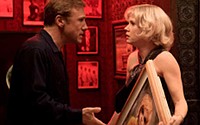 MUST
MUST  SEE
SEE
scr Scott Alexander, Larry Karaszewski
prd Tim Burton, Scott Alexander, Larry Karaszewski, Lynette Howell
with Amy Adams, Christoph Waltz, Danny Huston, Krysten Ritter, Terence Stamp, Jason Schwartzman, Madeleine Arthur, Delaney Raye, Jon Polito, James Saito, Elisabetta Fantone, Farryn VanHumbeck
release US 25.Dec.14, UK 26.Dec.14
14/US Weinstein 1h46

Art theft: Waltz and Adams



 With a sunny 1960s colour palette, Tim Burton keeps his darker impulses cleverly disguised in this superbly engaging film, recounting a jaw-dropping true story with raw emotion and black humour. Anchored by a moving performance from Adams, this is a movie about how easy it is to allow ourselves to slip into a dodgy situation. And it's also a provocative exploration of the meaning of art.
With a sunny 1960s colour palette, Tim Burton keeps his darker impulses cleverly disguised in this superbly engaging film, recounting a jaw-dropping true story with raw emotion and black humour. Anchored by a moving performance from Adams, this is a movie about how easy it is to allow ourselves to slip into a dodgy situation. And it's also a provocative exploration of the meaning of art.
After fleeing from an abusive marriage in 1958, Margaret (Adams) takes her daughter Jane (Raye, then Arthur) to San Francisco to start again, quickly meeting and marrying fellow painter Walter Keane (Waltz). A charmer, Walter soon starts selling Margaret's iconic paintings of huge-eyed waifs, initially claiming almost by accident that he's the painter. As the paintings become bestsellers, he revels in the limelight. Soon Margaret is sidelined completely, painting in secret while Walter lives the celebrity highlife. But her conscience won't let her stay quiet.
Burton keeps the film tightly focused on Margaret as Walter whirls around her like a fast-talking car salesman who never lets her express any doubts. So it's unnervingly easy to see how she lets herself fall into such a compromised position, and also exactly what prods her to take action. None of this is simplistic; Margaret knows she is complicit, and she understands Walter's self-deception, but she ultimately can't accept his lack of moral compass. And the artist in her has to get out somehow.
Where the story goes is remarkable, leading to one of the most hilariously deranged courtroom sequences in movie history. Unsurprisingly, the cast is a collection of actors who have unusually expressive eyes. Adams gives an openly emotional performance that carries a steely kick, while Waltz adds shadings to an over-the-top character who never quite becomes a villain. There are also strong small roles for Stamp (as a snide critic) and Ritter (as Margaret's bewildered friend), and Arthur has some superb moments as the older Jane.
Through all of this, Burton packs the screen with wonderfully subtle nuttiness, warped touches that audiences will miss if they're not paying attention. These add meaning and depth to the film, playfully lampooning the art world's often contradictory need for both public acclaim and creative integrity. But of course the real story here is about woman who quietly continued to do what she felt she was best at, regardless of criticism, exploitation or personal pain. And it's seriously inspiring that this focus is what made her a success.
 |
themes, language | 5.Dec.14 |

 Still waiting for your comments ... don't be shy.
Still waiting for your comments ... don't be shy.
HOME | REVIEWS | NEWS | FESTIVAL | AWARDS | Q&A | ABOUT | TALKBACK